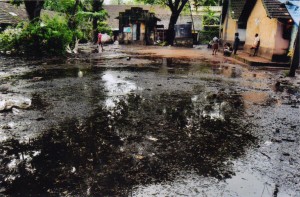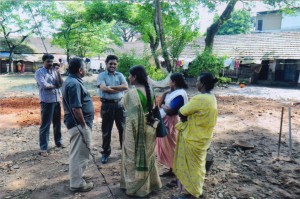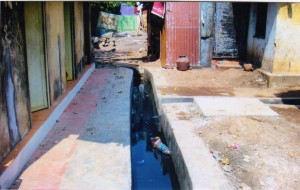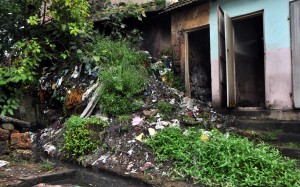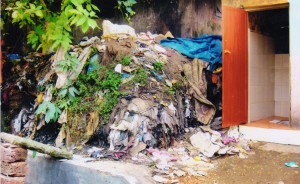Sanitation / Water-Logging Problems of Residents of Nadakkavu Cross Road, Corporation Colony
Wednesday, March 3rd, 2010This was a problem faced by the inmates of the Corporation Colony for the past 15 years. The residents of this colony are mainly sanitation workers employed by the Corporation. As the colony is centrally located, through time it has become the sewage centre of the surrounding buildings and the Sulabh Public Toilet. There was no proper toilet facility and many of them were dilapidated without any privacy. Further the drainage which poured in from outside was unbearable as it was seen to be full of human excreta. All this together created a bad stench and the water logged inside the colony without any outlet. Due to this, the residents lived a hellish life amidst squalor and filth. It affected the health of the people as the drinking water supply too was infested with worms. This forced them to search for drinking water from elsewhere. The women and children were the most affected because they stayed home most of the time. Another serious problem was that the residents were forced to use the pay-and –use Sulabh toilet outside the colony and this became a danger for the women and children during the night hours. The colony also faced severe water shortage as there was no proper water connection there. There was just one outlet for the whole colony of 39 families and here too the supply was limited to once a week.
This situation came to the notice of Streechetana and a PIL case was filed before the Honorable Ombudsman for Local Self Government Institutions in March 2010. A joint inspection consisting of the Corporation Engineer, Health Officer and the General Secretary of Streechetana was ordered by the Ombudsman to look into the condition of the Colony and submit a report with an estimate to the Corporation Secretary. After several sittings and arguments, many orders were passed, to be implemented by the Corporation, PWD and National Highway Division for the upliftment of the Colony. These were as follows:
- An approximate of 12 lacs was passed for the reconstruction of the toilets and bathrooms and it was completed successfully.
- All the open drain channels flowing into the colony were closed with cement slabs.
- Sand was brought in to level the waterlogged areas in the colony.
- New water connections were sanctioned in all the toilets and bathrooms.
- Drinking water facility and a storage facility was sanctioned to the colony.
- All the closed drainage systems inside the colony were opened out for the free flow of water.
- A culvert was ordered to be constructed on the national highway to facilitate the general drainage system of the area.
This proved to be a milestone in the growth and development of Streechetana and it hopes to do many other works for the benefit of the weaker sections of society.
| |
|
| |
|
| |
|
Subscribe Newsletter
Copyright©2012 Streechetana All Rights Reserved. Powered by Dhyeya











